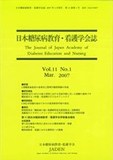Japanese
English
- 有料閲覧
- Abstract 文献概要
- 参考文献 Reference
- サイト内被引用 Cited by
2型糖尿病患者の食事自己管理行動を把握する食事自己管理行動質問紙(DSBQ)の信頼性と内容妥当性の検討を行うことを目的とした.栄養指導内容遵守の工夫と食事療法妨害要因への対処行動の2領域について面接調査を行い,作成したDSBQ案を用いて2型糖尿病患者110名を対象に調査した.栄養指導内容遵守の工夫は,①食事の規則性,②適性カロリー遵守,③おいしく健康的な食事をするの3つに分類され,さらに②では5因子,③では2因子が抽出された.食事療法妨害要因への対処行動は,①食事療法妨害要因への回避行動(外食時の回避行動を含む),②一時的逸脱行動,③逸脱からの修正行動の3つに分類され,さらに①では5因子,②では2因子,③では2因子が抽出され,内的整合性が確認できた(クロンバックα係数=0.55~0.83).また,test-retest法により,栄養指導内容遵守の工夫および食事療法妨害要因への回避行動で高い安定性が確認できた(rs=0.62~0.88,p < 0.001).DSBQは,2型糖尿病患者の食事自己管理行動を的確に把握することができる質問紙であることが確認された.
This study aims to examine the reliability and content validity of the Dietary Self-Management Behavior Questionnaire (DSBQ) which was developed to provide support for patients with type 2 diabetes in effectively carrying out Dietary Self-Management Behavior. Investigate interviews were conducted on the following two areas: 1) strategies/tools for the adherence to instructions for dietary regimen, and 2) factors involved in the coping behavior for relapse episodes to diet regimens. Based on data gathered from the interviews, the DSBQ was formulated, which was afterwards distributed amongst the 110 patients participating in the study. Strategies/Tools for the adherence to instructions on dietary regimens are classified into 3 aspects; ① regular eating behavior, ② eating behavior for restriction of energy intake, and ③ healthy eating behavior that does not sacrifice taste. In addition, “eating behavior for restriction of energy intake”(②) is extracted from five factors, and “healthy eating behavior that does not sacrifice taste”(③) is extracted from two factors. Coping behavior of relapse episodes to diet regimens is classified into ① evasive behavior towards diet regimens, ② temporary deviant behavior, and ③ corrective behavior after the temporary deviant behavior. In addition, “evasive behavior towards diet regimens”(①) is extracted five factors,“temporary deviant behavior”(②) is extracted from two factors, and“corrective behavior after the temporary deviant behavior”(③) is also extracted from two factors (Cronbach'sα= 0.55-0.83). Internal consistency is confirmed. High stability is confirmed by the test-retest method regarding the adherence to instructions for dietary regimens and coping behavior of relapse episodes to diet regimens (rs=0.62-0.88,p<0.001). The DSBQ developed in this study is confirmed to accurately support the development of self management behavior of patients with type 2 diabetes in clinical practice.
Copyright © 2007, Japan Academy of Diabetes Education and Nursing. All rights reserved.


